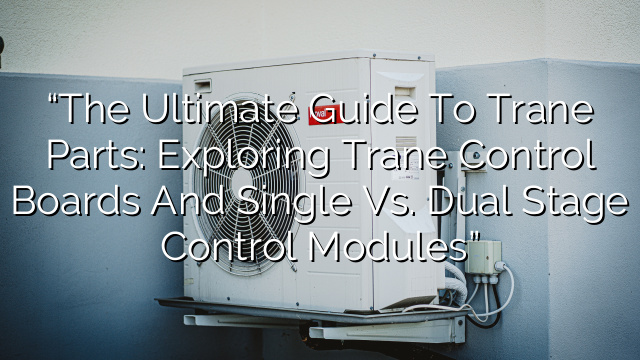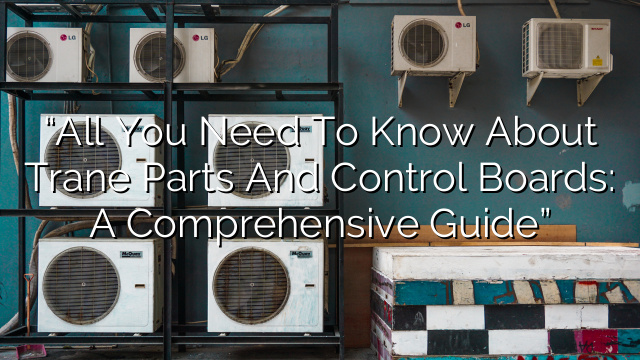Introduction
Welcome to “The Ultimate Guide to Trane Parts: Exploring Trane Control Boards and Single vs. Dual Stage Control Modules”. In this comprehensive guide, we will dive deep into the world of Trane parts, specifically focusing on Trane control boards and single vs. dual stage control modules. Whether you are a homeowner, HVAC technician, or simply curious about Trane parts, this guide aims to provide you with the necessary information to understand, troubleshoot, and replace these crucial components of your Trane system.
Understanding Trane Control Boards
Trane control boards are an essential part of your Trane heating and cooling system. They are responsible for regulating and coordinating the functions of various components within the system. A faulty control board can lead to issues such as improper temperature control, system malfunctions, and reduced energy efficiency.
Trane control boards come in different models to suit the specific requirements of different systems. They are designed to communicate with the thermostat, receive signals from various sensors, and control the operation of components such as blowers, valves, and motors.
Single Stage Control Modules
Single stage control modules are the most basic type of control boards found in Trane systems. They are designed to operate in a binary mode, where the system can either be on or off. When the thermostat signals the control board to turn on the system, it activates all the components at their full capacity. This means that the system operates at maximum output, regardless of the actual heating or cooling demands.
While single stage control modules are simpler in design and typically less expensive than dual stage control modules, they can be less energy-efficient. They may also result in temperature fluctuations, as the system can only operate at full capacity.
Dual Stage Control Modules
Dual stage control modules offer more advanced functionality compared to single stage control modules. They are designed to operate in two stages or levels, allowing for better temperature control and improved energy efficiency.
In a dual stage system, the first stage typically operates at a lower capacity, providing gentle heating or cooling when the demand is not too high. This helps maintain a more consistent temperature and reduces the need for frequent system cycling. When the demand increases, the control board activates the second stage, providing full capacity output to meet the increased demand.
Dual stage control modules are more sophisticated and provide improved comfort and energy efficiency compared to single stage control modules. However, they are generally more expensive and may require additional wiring and components to operate properly.
FAQs
- How do I know if my Trane control board is faulty?
- If your Trane system is not responding to thermostat commands or is not functioning properly, there is a possibility that the control board may be faulty. It is recommended to have a trained HVAC technician diagnose and replace the control board if necessary.
- Can I replace the control board myself?
- While it is possible to replace a control board yourself if you have the necessary knowledge and skills, it is recommended to consult with a qualified HVAC technician. They have the expertise to ensure proper installation and compatibility with your Trane system.
- How often should I replace the control board?
- The lifespan of a control board can vary depending on factors such as usage, maintenance, and environmental conditions. In general, control boards can last anywhere from 8 to 20 years. However, if you are experiencing frequent issues or malfunctions with your Trane system, it is worth considering the possibility that the control board may need replacement.
- Can I upgrade from a single stage to a dual stage control module?
- Upgrading from a single-stage to a dual-stage control module may be possible, but it requires careful consideration and evaluation of your Trane system. It may involve additional wiring and components, and consultation with a qualified HVAC technician is recommended to ensure compatibility and proper installation.
Conclusion
Trane control boards play a crucial role in the operation and performance of your Trane heating and cooling system. Whether you have a single stage or dual stage control module, understanding their functions and characteristics can help you troubleshoot issues and make informed decisions when it comes to replacement or upgrades.
If you are unsure about the condition or performance of your Trane control board, it is always best to consult with a qualified HVAC technician. They can diagnose any issues, provide expert advice, and ensure proper installation of replacement parts.






